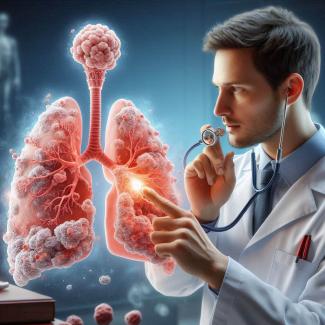
Alpha-1 antitrypsin deficiency (A1AT deficiency), also known as alpha-1 proteinase inhibitor deficiency, is a genetic disorder that affects the lungs and liver. It is caused by mutations in the SERPINA1 gene, leading to a deficiency in the alpha-1 antitrypsin (A1AT) protein. A1AT is primarily produced in the liver and plays a crucial role in protecting the lungs from damage caused by enzymes released by white blood cells, particularly neutrophil elastase. Without adequate levels of A1AT, the lungs are more susceptible to damage, leading to various lung diseases.
Key points about A1AT deficiency include:
- Genetic Inheritance: A1AT deficiency is typically inherited in an autosomal recessive manner. This means that an affected individual has two copies of the mutated gene, one from each parent. Individuals with one normal and one mutated gene are carriers and do not usually show symptoms.
- Lung Disease: The most common manifestation of A1AT deficiency is lung disease, which often presents as chronic obstructive pulmonary disease (COPD). Symptoms can include shortness of breath, wheezing, chronic cough, and recurrent lung infections. Smoking can exacerbate lung damage in affected individuals.
- Liver Disease: Some individuals with A1AT deficiency may also develop liver disease. The abnormal A1AT protein can accumulate in the liver, leading to liver damage. Liver disease in A1AT deficiency can present in infancy, childhood, or adulthood and may range from mild to severe.
- Diagnosis: A diagnosis of A1AT deficiency is typically confirmed through blood tests that measure the levels and function of the A1AT protein. Genetic testing can identify the specific mutations involved.
- Treatment: Management of A1AT deficiency involves various approaches:
- Intravenous A1AT Replacement Therapy: For individuals with severe lung disease, intravenous infusions of A1AT derived from human plasma can help slow the progression of lung damage.
- Lung Disease Management: Standard treatments for lung diseases like bronchodilators, pulmonary rehabilitation, and oxygen therapy are often used to manage lung symptoms.
- Liver Disease Management: Liver disease may require specific interventions, including transplantation in severe cases.
- Avoidance of Risk Factors: It is essential for individuals with A1AT deficiency to avoid smoking and exposure to lung irritants to minimize lung damage.
- Prognosis: The prognosis for individuals with A1AT deficiency varies depending on the severity of lung and liver involvement. Early diagnosis and appropriate management can improve outcomes.
- Genetic Counseling: Genetic counseling is recommended for individuals with A1AT deficiency and their family members to understand the risks, inheritance patterns, and potential testing options.
It's important for individuals with A1AT deficiency to work closely with healthcare professionals, including pulmonologists and hepatologists, to develop a personalized treatment plan and receive ongoing care to manage their condition effectively.
Symptoms A1AT Deficiency
The symptoms of Alpha-1 antitrypsin deficiency (A1AT deficiency) can vary widely depending on the severity of the condition and whether it primarily affects the lungs, the liver, or both. Some individuals with A1AT deficiency may remain asymptomatic or have mild symptoms, while others can experience more severe health issues. Here are common symptoms associated with A1AT deficiency:
- Respiratory Symptoms (Lung Involvement):
- Shortness of Breath: This is a common symptom, especially during physical activity.
- Chronic Cough: A persistent cough is often seen, sometimes producing mucus.
- Wheezing: Wheezing sounds during breathing may occur.
- Frequent Lung Infections: Individuals may experience recurrent respiratory infections, such as bronchitis or pneumonia.
- Reduced Exercise Tolerance: Due to lung damage, affected individuals may find it difficult to engage in physical activities.
- Liver Symptoms (Liver Involvement):
- Jaundice: Yellowing of the skin and eyes (jaundice) may occur in infants with liver involvement.
- Enlarged Liver: Some individuals may have an enlarged liver.
- Abdominal Pain: Pain or discomfort in the abdominal area is possible.
- Liver Cirrhosis: Over time, liver damage can progress to cirrhosis, which may lead to symptoms like fatigue, abdominal swelling, and confusion.
- Severity Varies: The severity of A1AT deficiency can vary greatly. Some individuals may develop symptoms early in life, while others may not experience noticeable symptoms until adulthood. The rate of disease progression can also differ among individuals.
- Risk Factors: Smoking and exposure to lung irritants can exacerbate lung symptoms in individuals with A1AT deficiency. It's essential for affected individuals to avoid these risk factors.
- Asymptomatic Carriers: It's important to note that not everyone with A1AT deficiency experiences symptoms. Some individuals may be carriers of a single mutated gene and have normal levels of alpha-1 antitrypsin in their blood. These carriers typically do not develop symptoms themselves but can pass the mutated gene to their offspring.
- Complications: Severe cases of A1AT deficiency can lead to significant complications, including severe lung damage requiring oxygen therapy or lung transplantation, or advanced liver disease necessitating liver transplantation.
Early diagnosis through blood tests and genetic testing is essential for individuals at risk of A1AT deficiency, as it allows for appropriate medical management and lifestyle adjustments. If you or someone you know is experiencing respiratory or liver symptoms, especially if there is a family history of A1AT deficiency, it's crucial to consult a healthcare provider for evaluation and diagnosis.
How to treat A1AT Deficiency Diagnostic and testing
The treatment and management of Alpha-1 antitrypsin deficiency (A1AT deficiency) typically depend on the specific symptoms and the extent of organ involvement (lungs or liver). Additionally, early diagnosis is crucial, and genetic testing is often used to confirm the diagnosis. Here's an overview of how A1AT deficiency is treated and diagnosed:
Diagnostic and Testing Process:
- Clinical Evaluation: The diagnostic process often begins with a thorough clinical evaluation by a healthcare provider. This includes discussing the patient's medical history, family history, and symptoms related to lung or liver problems.
- Blood Tests: Blood tests are used to measure the levels and function of alpha-1 antitrypsin (A1AT) in the blood. These tests can help confirm the diagnosis. Key blood tests include:
- Serum A1AT Level: A lower than normal A1AT level in the blood is indicative of deficiency.
- Serum Electrophoresis: This test can show the abnormal A1AT protein variants.
- Genetic Testing: Genetic testing can identify specific mutations in the SERPINA1 gene, which confirm the presence of A1AT deficiency and provide information about the genetic variants involved. Genetic testing can also determine whether an individual carries one or two copies of the mutated gene.
Treatment and Management:
The management of A1AT deficiency aims to alleviate symptoms, slow the progression of lung or liver disease, and improve overall quality of life. Treatment options include:
1. Intravenous A1AT Replacement Therapy: This is the primary treatment for individuals with severe lung involvement. It involves regular infusions of purified A1AT derived from human plasma. The infused A1AT helps protect the lungs from enzyme-mediated damage. This therapy can slow the progression of lung disease and improve lung function.
2. Lung Disease Management:
- Smoking Cessation: It is imperative for individuals with A1AT deficiency to avoid smoking and exposure to lung irritants, as these can worsen lung damage.
- Bronchodilators: Medications like bronchodilators can help relieve symptoms of bronchospasm and improve airflow.
- Pulmonary Rehabilitation: Pulmonary rehabilitation programs can enhance lung function and overall physical fitness.
- Oxygen Therapy: Supplemental oxygen may be necessary for those with severe lung disease to maintain adequate oxygen levels.
3. Liver Disease Management:
- Liver Transplantation: In cases of severe liver disease, liver transplantation may be required.
- Symptomatic Treatment: Management of liver disease may involve addressing specific symptoms and complications, such as jaundice or cirrhosis.
4. Genetic Counseling: Genetic counseling is recommended for individuals with A1AT deficiency and their family members. It helps individuals understand the inheritance pattern, assess the risk to offspring, and make informed decisions about family planning.
5. Lifestyle Modifications: Adopting a healthy lifestyle, including a balanced diet, regular exercise, and avoiding alcohol and certain medications, can help manage A1AT deficiency.
Treatment and management plans are typically tailored to each individual's specific needs and the severity of their condition. Regular monitoring by healthcare providers, including pulmonologists and hepatologists, is crucial to track disease progression and adjust treatment as needed. Early diagnosis and appropriate interventions can significantly improve outcomes for individuals with A1AT deficiency.
A1AT Deficiency Medical Support Team
Individuals with Alpha-1 antitrypsin deficiency (A1AT deficiency) often require a medical support team consisting of various healthcare professionals to provide comprehensive care and management of their condition. The composition of the medical support team may vary depending on the specific needs and symptoms of the individual, but it typically includes the following specialists:
- Pulmonologist: A pulmonologist is a physician who specializes in the diagnosis and treatment of respiratory conditions. For individuals with A1AT deficiency, a pulmonologist is crucial in assessing and managing lung-related symptoms and complications, such as chronic obstructive pulmonary disease (COPD), chronic bronchitis, and emphysema. They may perform lung function tests, recommend treatments, and monitor lung health over time.
- Hepatologist: In cases where A1AT deficiency affects the liver, a hepatologist, or a gastroenterologist with expertise in liver diseases, is essential. They can assess liver function, monitor liver disease progression, and provide appropriate treatments. In severe cases, they may evaluate the need for liver transplantation.
- Genetic Counselor: A genetic counselor is a healthcare professional trained in genetics and counseling. They can provide individuals and families with information about the genetic basis of A1AT deficiency, inheritance patterns, and the risks associated with having children with the condition. Genetic counselors can also facilitate genetic testing and help individuals make informed decisions about family planning.
- Respiratory Therapist: Respiratory therapists are skilled in respiratory care and can provide support for individuals with A1AT deficiency, particularly those who require oxygen therapy or breathing treatments. They can teach breathing techniques and help manage respiratory equipment.
- Nurse Practitioner or Physician Assistant: Nurse practitioners (NPs) and physician assistants (PAs) often work closely with pulmonologists and hepatologists to provide ongoing care, monitor symptoms, adjust treatment plans, and educate patients and their families about managing A1AT deficiency.
- Nutritionist/Dietitian: Proper nutrition is essential for individuals with A1AT deficiency, especially those with liver disease. A nutritionist or dietitian can develop dietary plans to support overall health and manage specific nutritional concerns related to liver function.
- Physical Therapist: Physical therapists can assist individuals in maintaining and improving their physical fitness, lung function, and mobility. Pulmonary rehabilitation programs, which often involve physical therapy, can be beneficial for individuals with lung involvement.
- Psychologist or Counselor: Living with a chronic medical condition like A1AT deficiency can be emotionally challenging. Psychologists or counselors can provide support for managing stress, anxiety, depression, and coping with the emotional aspects of the condition.
- Transplant Team: In cases where liver or lung transplantation is necessary due to severe organ damage, a transplant team comprising transplant surgeons, transplant coordinators, and other specialists will be involved in the evaluation, surgery, and post-transplant care.
- Primary Care Physician: Your primary care physician plays a critical role in coordinating care among various specialists, managing other health concerns, and ensuring that medications and treatments are integrated into your overall healthcare plan.
- Pharmacist: Pharmacists can provide guidance on medications, including those used in A1AT deficiency treatment, and help manage potential drug interactions or side effects.
Coordinating care among these healthcare professionals is vital to ensure that individuals with A1AT deficiency receive comprehensive and integrated medical support tailored to their specific needs. Regular check-ups and ongoing communication between team members and the patient are essential for effective disease management and improving quality of life.




